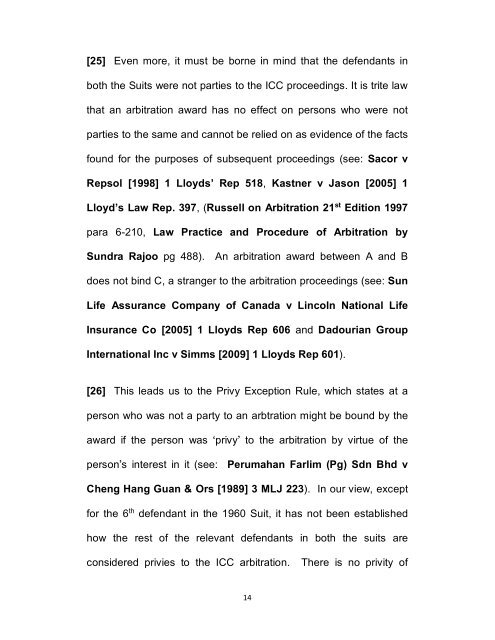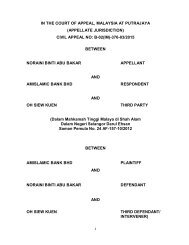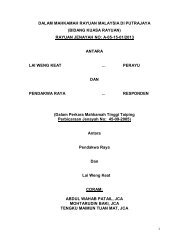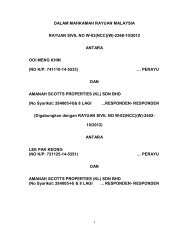W-02IM-2069-2010
W-02IM-2069-2010
W-02IM-2069-2010
You also want an ePaper? Increase the reach of your titles
YUMPU automatically turns print PDFs into web optimized ePapers that Google loves.
[25] Even more, it must be borne in mind that the defendants in<br />
both the Suits were not parties to the ICC proceedings. It is trite law<br />
that an arbitration award has no effect on persons who were not<br />
parties to the same and cannot be relied on as evidence of the facts<br />
found for the purposes of subsequent proceedings (see: Sacor v<br />
Repsol [1998] 1 Lloyds’ Rep 518, Kastner v Jason [2005] 1<br />
Lloyd’s Law Rep. 397, (Russell on Arbitration 21 st Edition 1997<br />
para 6-210, Law Practice and Procedure of Arbitration by<br />
Sundra Rajoo pg 488). An arbitration award between A and B<br />
does not bind C, a stranger to the arbitration proceedings (see: Sun<br />
Life Assurance Company of Canada v Lincoln National Life<br />
Insurance Co [2005] 1 Lloyds Rep 606 and Dadourian Group<br />
International Inc v Simms [2009] 1 Lloyds Rep 601).<br />
[26] This leads us to the Privy Exception Rule, which states at a<br />
person who was not a party to an arbtration might be bound by the<br />
award if the person was ‘privy’ to the arbitration by virtue of the<br />
person’s interest in it (see: Perumahan Farlim (Pg) Sdn Bhd v<br />
Cheng Hang Guan & Ors [1989] 3 MLJ 223). In our view, except<br />
for the 6 th defendant in the 1960 Suit, it has not been established<br />
how the rest of the relevant defendants in both the suits are<br />
considered privies to the ICC arbitration.<br />
There is no privity of<br />
14





